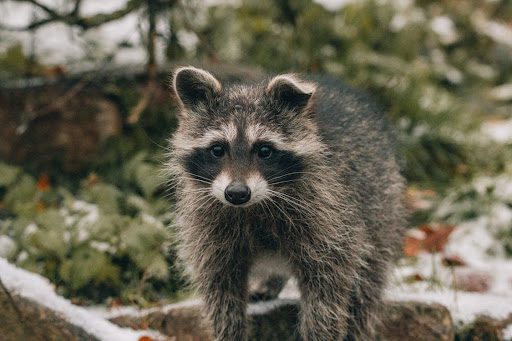Regardless of how cute raccoons look, they aren’t exactly desired houseguests at any time during the year. They are notorious for property destruction, scavenging through trash, and spreading dangerous diseases, such as rabies. Moreover, they can live on just about anything, including fallen tree trucks, holes in trees, burrows abandoned by other animals, attics, crawl spaces, and more.
What’s more is that raccoons are one of the few urban animals that happen to be active throughout winter. It means that they don’t actively hibernate and can easily seek refuge from the cold by hiding within your house. When that happens, you will have to deal with a whole host of wintertime raccoon problems that might lead to costly damages.
When to Expect Raccoons
You can expect to see raccoons around your property throughout fall and during winter because they will try to beat the cold by finding hiding spaces in your barn, attic, shed, basement, crawl space, etc. Once a raccoon seeks refuge within your property, you will need to humanely remove it to prevent the pest from mating and destroying your property and belongings.
Are Raccoons Active During Winter?
In the winter months, most animals enter a state of hibernation known as torpor. During exceptionally cold weather, raccoons will hibernate as well. In this state, their bodies will shut down, and they will enter a deep slumber, allowing them to conserve energy and fat levels in their bodies. Raccoons are unlikely to come out of their dens during this phase. However, if their den is inside your home, it causes multiple problems, including stolen food, transference of bacteria, and more.
Moreover, if the weather isn’t as cold during winter and a raccoon has sought refuge inside your home, it will remain active. It will find food in your trash to sustain itself. Moreover, you will also find droppings near its den. The feces and urine can easily spread diseases. Raccoon feces also contains roundworms, whose eggs can survive freezing temperatures, making them dangerous during and after winter.
Furthermore, since raccoons carry rabies, you certainly don’t want them anywhere near your home and deal with wintertime raccoon problems. If you think you have a raccoon infestation in your home, it’s best not to go near the pests and call a professional pest control company for help.
Signs of a Raccoon Infestation
Here are some signs you need to watch out for to determine whether raccoons have taken refuge in your home or not:
- Small piles of droppings near trees, wall frames, rooftop, attic, crawl spaces, etc.
- Tracks or smudge marks on decks, walls, and in soft ground near your gutters and pipes
- Ransacked garbage cans outside your home
- Half-eaten or destroyed chicken wires or damaged fences
- Missing pet or human food from the pantry or barn
How to Keep Raccoons Out of Your Home during Winters
Here are some tips to keep raccoons out of your property during winters:
- Examine your home’s exterior to make sure that you haven’t left any openings for the pests to find their way into your home. If you find any damaged wood or weak attic and crawl space foundations, fix them to prevent raccoons from entering your house. These animals can get through a hole as small as a softball, so be mindful of fixing all the cracks and holes you find.
- Clear out your summer and fall garden before it does to seed and throw away all the dead vegetation to prevent raccoons from hiding in them. If you use a compost bin, keep the lid on at all times.
- Keep all your trash can lids sealed properly at all times to prevent raccoons from scavenging through your garbage and spreading diseases.
- If you keep chicken within the boundaries of your property, keep them in your coop all night and secure them with wire mesh to keep the raccoons out.
- Don’t leave your pet’s food or water outside overnight, as it will only attract the nocturnal raccoons toward your home.
- Always cap your chimneys as these clever fellows can find their way into your home through the rooftop.
- Install fitted covers over your vents
- Put up fences around your home
Naturally, these tips will not always succeed in keeping these animals out of your home, but taking these proactive measures will certainly make a difference.
What to Do When Your Find Raccoons in Your Home
Remember that, despite their cuddly appearance, raccoons are dangerous wild animals as they carry pathogens that spread diseases. Moreover, when cornered, they can act aggressively and hurt you. So, if you think you have raccoons living in any part of your home, don’t try to get rid of them yourself.
Instead, put your trust in a reliable wildlife and pest removal company that will have the insight to wear the right protective gear to prevent the spread of parasites and diseases from interacting with raccoons. Moreover, if a female raccoon has sought refuge in your home, it might be preparing to give birth or already has given birth. In such an instance, you certainly don’t want to cause harm to the pests. A professional pest control company will be able to remove them from your property humanely.
Call Ants Pest Control
At Ants Pest Control, we have the tools, expertise, and safety gear to eliminate the raccoons from your home safely and humanely. We can also give you valuable advice to make your home raccoon-proof to avoid future infestations. Moreover, after the removal, we will make sure to clean and sanitize every inch of the affected space to ensure your safety and well-being.
